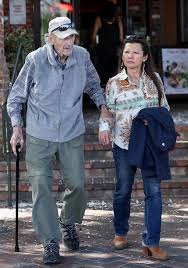
Gene Hackman and the ogre of Alzheimer’s Disease
By Femi Olugbile
Eugene Allen Hackman has been considered as one of the greatest American actors of his generation. His acting career spanned forty years, during which he received two Academy Awards and four Golden Globe awards, among other distinctions. Many people would remember his role in the 1971 film- The French Connection.
The wiry, crusty man with an ugly yet kindly face was a perfect screen embodiment of an unvarnished warts-and-all reality and a commitment to pursue what was right, no matter whose ox was gored.
In 1956 Hackman started his acting career with small roles in film and in Broadway theatre.
It time he became established in leading and supporting roles in major films.
In 2004, in an interview with Larry King, he disclosed that his acting career was all but over.
He started writing novels in the historical fiction genre.
As with many Hollywood celebrities, there was a certain amount of rough and tumble in his personal life, and his family bore the ravages of a celebrity father who was seldom present. He had got married in 1956 and had three children. The couple were divorced in 1986.
Five years later, he married his second wife – a classical pianist named Betsy Arakawa, who he met in Hawaii.
From the time of his announcement concerning the end of his acting career, he withdrew – more or less, from public attention. He and Betsy bought an isolated home in a gated community in New Mexico. Neighbours would occasionally see them walking together, and they observed that he was looking frail, though they had no clear idea what problem he had.
Late last month, the world woke up to the news that Hackman and Betsy had been discovered dead in their home. They had been dead for several days before their bodies were discovered.
Initially there was some worry about the possibility of foul play.
On detailed investigation, it emerged that Betsy, had died first. That happened probably on the 12th of February, from a rare viral infection of the lungs. Hackman did not die until six days later – on February 18. That was the point at which his pacemaker recorded an abnormal rhythm.
The truly grisly picture was that for several days after the sudden death of his wife and carer, Hackman was totally helpless. He did not have enough cognitive power left to call out for help, or to look after himself. He was drinking water, which he apparently had ready to hand. But he could not make food or search for it. It must have been a long slow agonising death. How much he was aware that he was even dying is open to contention. His autopsy recorded death as being due to severe heart disease, complicated by kidney disease. But the true reason he died was that he was deprived of the ability to survive unaided by severe Alzheimer’s disease. Once his caregiver was taken away, he was totally at the mercy of nature.
The process of insidious decline from a celebrity figure on the world stage to a helpless totally dependent person mirrors the experience of many people who work in the field in of mental health in different parts of the world with some of their patients, and depicts the reality and abiding menace of advanced Alzheimer’s disease.
Apart from the core issue of the illness itself, there may be unique medico-legal issues surrounding the development of Alzheimer’s disease in a family member. Such matters will inevitably come up in the evolving drama of the Hackmans. One such matter is the estate of the individual. A person of means who develops the beginnings of Alzheimer’s disease these days runs the risk of having his family applying for power of attorney to take over his financial affairs. When death occurs, whatever Will has been written may be contested, with an effort by aggrieved family members to prove the person was not ‘competent’ when he wrote it. In Hackman’s case, his Will has revealed that all his property were meant to go to his wife Betsy, with no mention, apparently, of his three children. An examination of Betsy’s Will, for its own part, has shown that it stipulates that if she dies, everything she has is to go to Charity. Lawyers must be sniffing blood in the unfolding scenario, hovering around the family, anticipating the legal fireworks that are almost certain to follow as the two Wills are contested.
Alzheimer’s disease is a progressive degenerative disease of the brain which affects 24 million people world-wide. It affects females somewhat more than men. One in every ten people aged 65 years and above suffer from the condition in mild, moderate or severe form. One in every three people aged 85 and above have Alzheimer’s. Its progress is characterised by memory loss, difficulty in planning or solving problems, difficulty completing familiar tasks at home or work, confusion and behavioural changes.
Up till recently the focus of available medications for the condition was an effort to slow down the inevitable decline. Recently a new ‘wonder’ drug has been approved in the USA which shows potential to arrest the illness if used in the earliest stage. Frantic research efforts are ongoing to seek more effective treatments for this illness, which is one of the most dreaded medical conditions on earth.
A lifestyle of healthy living with regular physical exercise, healthy diet, social engagement, avoidance of smoking, regular sleep, and keeping blood pressure and cholesterol levels under check may reduce the risk of developing dementia in later life, but there is no absolute guarantee.
Caring for an increasing population of elders with dementia consumes huge resources in medical and social care in different parts of the world. As can be seen from this American story, no system is perfect, yet.
